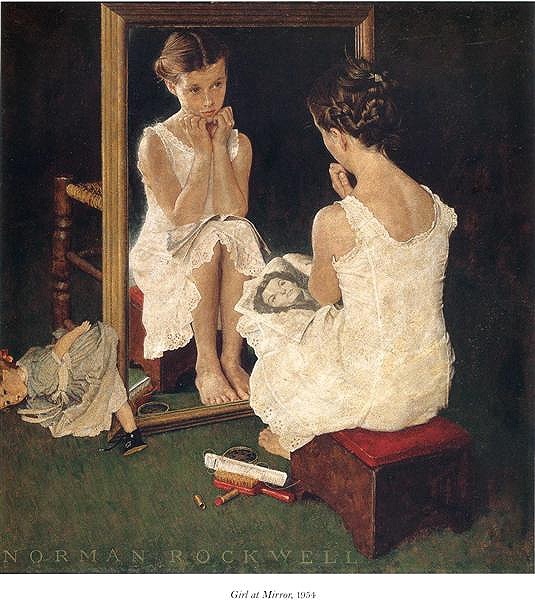Liedentity

Norman Rockwell: Girl at Mirror (1954)
"If you really want to know my identity, just get in line behind me."
Excuse me, please, for even bringing up this topic, but I seem to be experiencing an identity crisis. I, perhaps naively, believed that my identity was mine, a deeply personal characteristic I shared with nobody else. It might seem similar to others' without mapping one to one, a one-of-a-kind. I'm coming to recognize that discovering my underlying identity might serve as a pillar of personal enlightenment. Describing it might prove impossible but attempting to describe it might prove a useful medium for actual self expression, and a necessary one. I might achieve nothing more than rough approximations of descriptions and still satisfy myself, even others, that I was coming to really know myself: who I was, who I am. But recently, identity seems to have turned into something else, a perspective almost exclusively turned away from self and toward somebody else. Identify might have become the replacement meaning of identity, where I exclusively seek myself in somebody else. ©2020 by David A. Schmaltz - all rights reserved
Identity Politics seems founded upon the principle that self belongs to collective associations, that the source of identity just might reside within relations with others. Under this curious notion, I find myself when I, for instance, locate my tribe. I identify and therefore I am, as if I was unformed protoplasm until I stumbled upon this collection of others, and, seeing certain similarities, I suddenly manifested a self formerly hidden from me. I might become a Christian and so become myself, or an anarchist, then finally see my true identity. I believe at least tentatively, that such identification more closely approximates a Liedentity than an actual Identity, because how could self possibly only manifest when identifying and associating with anybody else? It seems more likely that one must bring a self into a collective than that a collective somehow imparts a self.
But still, this proliferation seems clear. I hear people introducing themselves as their party affiliation, proudly (for some unknowable reason) announcing, "I am a Republican." I deeply doubt their assertion. I translate it as meaning that they identify with some unnamed elements of the Republican philosophy, and that they've perhaps sidestepped the hard work of forging that element of their own identity discovering by simply adopting some previously more publicly crafted one. I think that this hardly qualifies as identity and might well be co-opting any actual advancement toward enlightenment. It might be that as long as one clings to external archetypes as surrogates, they successfully ward off identifying their own identity.
My identity holds certain liberal values, but these hardly render me a card-carrying liberal. (Remember, back in the day, no one could be said to actually "be" an authentic communist unless they carried a card declaring them so. Card carrying communists were the communicable kind, apt to infect anyone with which they came into contact. Dangerous!) I also hold certain very conservative values, but I'd never label myself "a conservative," for I believe most fervently in the future and in the likely beneficence of difference. Who am I? That's a tough question, not blithely dispatched by disclosing with whom I most closely identify. Identify seems to be the lie in Liedentity, for it holds the similarity, not identity, and thereby materially misrepresents self. I can easily vote for a Democrat without necessarily being one, whatever that is. I understand, and deeply, that I only rarely identify with Republican values, which seem immoral to me, yet I am not anyone's exemplar of morality.
We're complicated beings, though we're continually being classified and categorized for the purpose of analysis. If the quants can corner us into agreeing with their characterizations of us, I guess that they get some confirmation or something. My identity seems awfully unique, the product of personal work so deep I dare not attempt to disclose it. I know, nodding to myself, how I'm different from everyone else, and this understanding distinguishes and ennobles me. I degrade myself whenever I agree to declare my identity as any gross classification. Yes, I identify with this and not that, but my affiliation never once actually defines who or what I am. I am reliably informed that I am a man, but that's hardly my identity. If you really want to know my identity, just get in line behind me. Once I discover a way to share my discovery, you could be the first one I tell.
E Pluribus Unum requires little congregation to manifest. It instead seems to demand collections of utterly unique individuals dedicated to collaborating anyway. Not because each identifies with every other, but more probably because each does not see themselves standing beside themselves. It seems a perversion of our founding principles that we might insist upon close similarities rather than upon tenacious difference. I won't need to exercise my sacred tolerance unless we each exhibit some disturbing difference. Should we homogenize, we will have successfully undermined the very principles we espouse. I want to thank radio and television, and their progeny, social media, for so effectively focusing our attentions on ever-more-alluring out theres. I'm still convinced that my identity resides within some secret in here and not anywhere else. I'll gladly bring myself to any dance just as long as I can reasonably expect to meet someone I can't quite relate to yet. I bring myself in the sincere hope of meeting someone else, not just some knock-off analogue of a me I've never met.


